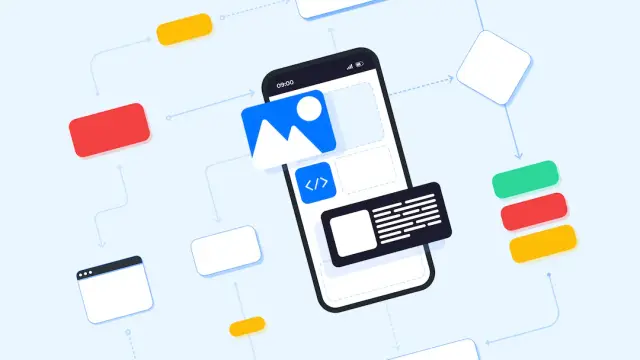How No-Code/Low Code Can Solve the Problems of Your Business
Solve business problems with no-code and low-code solutions and inspect the future of no-code, low-code development.

Once hailed as the innovative way of the future, software development is now deemed a basic necessity that drives every industry. Mankind's reliance on computers to solve problems and execute programming functions has increased steadily over the inception of computers in their most basic form.
A Brief History of Software Development
From the beginning, computers and corresponding software development have experienced massive technological advancement over time. These innovations impact the way we do business and live our daily lives. They also affect the way computers process and disseminate information. However, these technological advancements would not be possible without their predecessor: the human brain!
The human brain, also known as one of the earliest computers, has long been able to analyze, deduce, and arrive at logical solutions to complex problems. In fact, the human brain in its biological form is the purest example of the power of supercomputers. Even more, awe-inspiring is that humans have not yet tapped into their full potential for complicated permutations and reasoning.
Physical computes mimic the human brain's function, capacity, and information processes. The CPU or central processing unit is the 'brain' of all computers and is essential for programming or coding software applications.
The programming of computers has become so advanced today that we no longer have to rely on the expensive expertise of certified software developers. Traditional methods of programming computers have long depended on developers writing complex text-based coding. These software application developers often commanded top priority in the budget of businesses. Their expertise was regarded with as much importance as a business's costly computers and other tech assets! Today, modern software development has experienced the rise of citizen coders or developers. This means that in-depth knowledge of computers and software programming is no longer required, thanks to no code/low code development.
Why Low-Code No-Code is the Future?
Based on the proliferation of software development companies on a rapid scale, it is clear that low-code no-code applications are the way of the future. The digital landscape has become fast-paced, resulting in greater demand for no-code/low-code software development. Low-code, no-code software development uses visual development platforms for mobile programming solutions for businesses.
These programming platforms rely heavily on visual drag and drop functions and ready-made templates for software development. No code/low code development has become simplified due to visual platforms.

These no code/low code development platforms minimize the amount of programming required to create a mobile application. With visual application development templates, businesses can build out applications without using a software developer. Because no code/low code development utilizes a visual platform, citizen developers require very basic coding skills. Visual platforms for software development reduce the business's dependence on developers to create mobile applications.
This puts the 'power' for application development squarely back in the hands of non-coders. As a result of increased business demand for visual development, there has been a corresponding increase in the need for software development companies. These companies offer a range of no-code/low-code visual development platforms for businesses.
Its developers are integral to the programming that optimizes these no code/low code development platforms in the first place! These no code/low code development companies are among the most popular technological startups in recent times. Their rapid rise has resulted in many more businesses relying on no-code, low-code software development platforms and applications. These no code/low code development using visual platforms are the way of the future.
Why is No-Code Important?
No-code/low-code platforms have evolved to become an increasingly important software application development tool for businesses. These no-code, low-code development platforms have given businesses more flexibility to create their own mobile applications for users. With reduced reliance on expert software developers, companies can quickly respond to new business trends in the market. No-code/low-code visual application development platforms also make it easier for non-developers to meet the needs of their users with more agility and speed.
They also help streamline workflows that normally require the programming expertise of a team of software developers. Productivity application development platforms such as FreshDesk feature enhanced automation features that allow businesses to track customer support and employee workflows better.
Other application development platforms such as AppMaster utilize no-code, low-code development, which helps businesses to generate their mobile and web applications more efficiently. This helps business managers with little technical skill to create applications and provide business solutions for their clientele at a faster pace.

In the world of software application development, the speed at which businesses are able to respond to market trends can make or break them. No-code/low-code visual development platforms are important in helping businesses respond more quickly to these needs.
With simple visual development functions, no-code/ low-code platforms reduce the need for complex coding software or software developers. No-code/ low-code development platforms also reduce business operational costs because there is less need to hire software developers to create programming from scratch.
What are the Benefits Associated with Adopting a No Code Development Platform?
Many advantages exist for businesses that choose to adopt a no-code development platform for creating mobile applications.
Efficient Problem-Solving
Employees within a business may have varying levels of competencies and problem-solving skills. No-code/ low-code make it possible for these individuals to have more autonomy over problem-solving within their departments. This is because the very nature of no-code, low-code development decentralizes the problem-solving process.
It gives problem solvers who may not have the formal training of a traditional software developer greater control. As a result, no-code, low-code application development platforms facilitate more efficient problem-solving and collaboration among teams.
Identifies Problem Solvers
No-code, low-code platforms allow management teams to identify problem solvers within the organization. Within the business, managers who can identify problem solvers increase their existing pool of available human resources. As a result, organizations have an increased knowledge base within the organization for problem-solving.
This makes it much easier to task resident problem solvers to develop or organize workflows and processes using business application platforms. Effective no-code problem solvers can also benefit from greater opportunities to promote talent from within. No-code, low-code development platforms reduce the need to outsource external software developers for problem-solving.
Faster Deployment
No-code low-code contributes to businesses' problem-solving capabilities through rapid application deployment. This rapid deployment makes it easier for citizen software developers within the business to create solutions for their clients more quickly. No-code, low-code software development platforms enable mobile applications to be launched into the market at a faster rate.
This reduces the time that would have otherwise been spent searching for the right team of software developers. Faster deployment of business apps created with visual application development platforms allows businesses to adapt to market changes quickly. Their flexibility and speed with which their applications are deployed can mean a greater edge over their competition and greater profit!

Autonomous Software Development
Businesses are able to develop, test, receive user feedback and implement software development upgrades on their applications. This process is significantly streamlined to in-house talent, which gives businesses greater control over the process. The increased autonomy of their software development process allows businesses to forego the additional cost of hiring software developers. By reducing the need for external software developers, organizations have greater involvement in the back-end technical and creative processes of their business.
How Does Low-Code No-Code Work?
Non- developers must understand their differences to provide the best software solutions for their business. Low-code, no-code software development platforms are not a 'magical' solution to your coding issues. Nor are they a 'one size fits all solution to the programming needs of citizen developers. In reality, these visual development tools significantly reduce the need to write coding. They also reduce the reliance of non-coding developers on complex programming languages to create mobile and web applications.
However, to understand how best to implement no-code low code development, you will need to have some knowledge of how they work. Although very similar, the software development principles of common and no code are not exactly the same. Many developers find that low-code, no-code development platforms work to complement each other instead of by themselves. Some knowledge of basic coding is required for low-code development platforms. However, no code development applications do not require any programming knowledge.
Businesses can simply use the drag and drop features of visual no-code templates to create business applications. No-code, low-code development tools help citizen developers reduce their dependence on expert software developers. Because of these advantages, businesses are able to generate and launch new mobile applications within a shorter time. No code low-code development increases the rate at which an organization can implement technological improvements. With little technical knowledge, it allows businesses to create mobile applications at a reduced cost.
Indeed, software developers are needed at the outset to create these visual software development applications in the first case. However, no-code, low-code development platforms provide an agile environment for mobile development. These visual application development tools help businesses to pivot quickly to meet their needs.
Limitations of No Code Low Code
While no-code, low-code development application tools may solve many problems for businesses, they do have some limitations. As a result, the convenience of using no-code/ low-code visual applications can create a slight disadvantage.
Disruption
Low code no-code development platforms may create software security issues for the business. Because of the relative simplicity of a no-code or low-code solution, malicious employees may manipulate processes on the back-end of these applications. This individual is referred to by software developers as 'shadow I.T' and can create problems for a business! The disruption of business software development applications can significantly disrupt employees' workflow.
This disruption also causes customer processes problems and interrupts end users' established application functions. In some cases, these employees didn't actually have bad intentions but were simply careless or curious. However, 'shadow I.T' behavior can still negatively affect the business's application tools and create problems for its bottom line.
AppMaster takes an entirely different approach. It generates applications, compiles, and runs them. Due to this, the code remains unchanged; in other words, compiled applications cannot be changed during operation unless the process of publishing a new version has passed. This ensures that the application does not change during operation and the scripts do not change. All this provides a high level of security.
External Application Developers
We can all agree that low-code and no-code application platforms provide businesses with a great degree of autonomy. However, it also goes without saying that application developers would have done the initial computer programming. These software developers would have created the initial coding software and programming of the visual application platform and would be in possession of its original coding. This can create problems when the business wishes to customize its application.
Software developers may create applications with features that are 'locked.' This software is created in a way that users cannot edit or upgrade the application without their consent. Since external developers created the application software, businesses would also be at their mercy when they wish to scale up their technology stack.
These developers may charge exorbitant fees for access to 'premium' software development features. Businesses may also be restricted by the application developers' licensing agreements and vendor policy. These legal loopholes may create problems for businesses that wish to scale up their technology or customize applications.
Unlike the solutions described above, AppMaster generates the source code for each application and can provide the customer with ready-made compiled application binaries and sets of source codes for each platform. AppMaster is dynamically developing; new languages are being added, which means that when new generators appear, the customer can create an application in any other technology stack or programming language without changing customers’ applications.
Is No-Code Development Any Good?
Despite its limitations, there are many benefits to using no-code solutions within your business. Among the distinct advantage of no-code solutions are that their visual-based no-code software templates are easy to use. No-code solutions help businesses to develop applications without technical knowledge and do not require developers to program the software.
Cheaper
No-code, low-code development platforms are cheaper to implement than getting the services of full-stack software developers. These no-code solutions give businesses a cheaper alternative to using software developers, traditional programming, or complex coding languages. No-code solutions are perfect for small to medium-scale businesses because they utilize less cash and technological resources. Instead of a dedicated team of software developers, no-code software platforms provide a more cost-effective solution to building business applications.

More Secure
Projects that are too sensitive to be outsourced can now be handled in-house. A company may be working on a high-stakes application for which the competition is high. Using a no-code solution, they can control how many individuals are privy to the application's software development. As a result, they are able to keep the information about the project as private and confidential as possible. This is in stark contrast to projects that have large teams of software developers working on a task at any given time.
Greater Control
With large-scale software development projects, it is almost inevitable that there will be unauthorized leaks of top-secret details about an upcoming mobile application. No-code platforms give business owners greater peace of mind. This is because they can develop their software and oversee the creation of the application directly.
No-code platforms reduce the need to hire external developers, thus giving businesses more power over their software development process. Greater control over the software development process allows businesses to keep a tighter rein on the details of their projects. This also helps keep their confidential information secure from competitors.
Benefits of Using No-Code Development
Faster Turnaround Time
Businesses rely on software platforms that support agile technology solutions. This is because the digital marketplace is fast-paced and competitive. Businesses that hope to stay competitive must adapt to the changing demands and needs of the market within which they operate. As a result, technological innovation and software development is no longer an option but rather a necessity.
Competitive Edge
In an effort to keep up with their competitors, businesses need to be able to create and launch their mobile applications at a faster rate than their competitors. No-code development makes this possible, as businesses can create ready-to-market applications in less time than traditional development. These no-code visual application platforms help non-coders create and launch mobile applications that can rival their competitors' technology. More importantly, they are able to respond faster to the increasing demands of end users and stay ahead of market trends.
Simple to Use
No-code development platforms are relatively user-friendly and simple to use. This allows citizen developers with basic coding skills to use these software and app development tools. This simplicity reduces the need to hire external software developers and, for non-coders, reduces their anxieties about technological development. No-code platforms assist businesses in redirecting their energies from the back-end technological operations to the actual management of their company.
Compared with other options, no-code development ranks high as one of the most viable, fast, and cheap alternatives to creating business applications. As a result, we can say that no-code solutions are not only here to stay but also, they are the way of the future.
The Future of Software Development
It is no cheap feat that we have been able to benefit from the modern advancements in software technology solutions today. Without a doubt, this has steadily evolved and continues to be a source of technological innovation as we move toward the future. Businesses have and will continue to benefit from these technological advancements. These advancements have significantly impacted the choice of the technology stack used in application development platforms.
It also impacts the businesses' software development costs and overall expenses. In addition, the chosen software development method affects the flexibility and competitiveness of the business. This is usually determined by the speed with which it is able to launch its no-code, low-code applications to market.
Obviously, these no code/low code development solutions are here to stay. These agile and responsive software development methods are the way of the digital future! No code/low development automates processes, has a lower learning curve, and is cheaper, faster, and more efficient than traditional programming methods.
They also save time, money, and energy, which are valuable resources in a business. These software development solutions are scalable and can be customized to suit the needs of your business, no matter the size. In order to choose the best software solutions for your business, it makes sense to explore the advantages of using no code low code development tools.
Conclusion
When compared with the more traditional and costly approach to software development, these tools are light years into the future! No code/ low code provides today's businesses with viable alternatives to improve their mobile application offerings to their clients. They also provide businesses with a viable alternative to streamline their operations and develop software solutions in a way that is cheaper, quicker, and more efficient.
AppMaster's application development platform can provide trustworthy no-code software alternatives for your business. Our platform is reliable, cost-effective, and knowledgeable in no-code application development. Whatever your business needs, AppMaster can handle it as it is, integrated no-code software development solutions for your business.
The AppMaster platform can facilitate your build of full-featured software with back-end, frontend, and advanced native mobile applications provided. We would be happy to schedule a consultation with you to explore our platform features and pricing plans!





